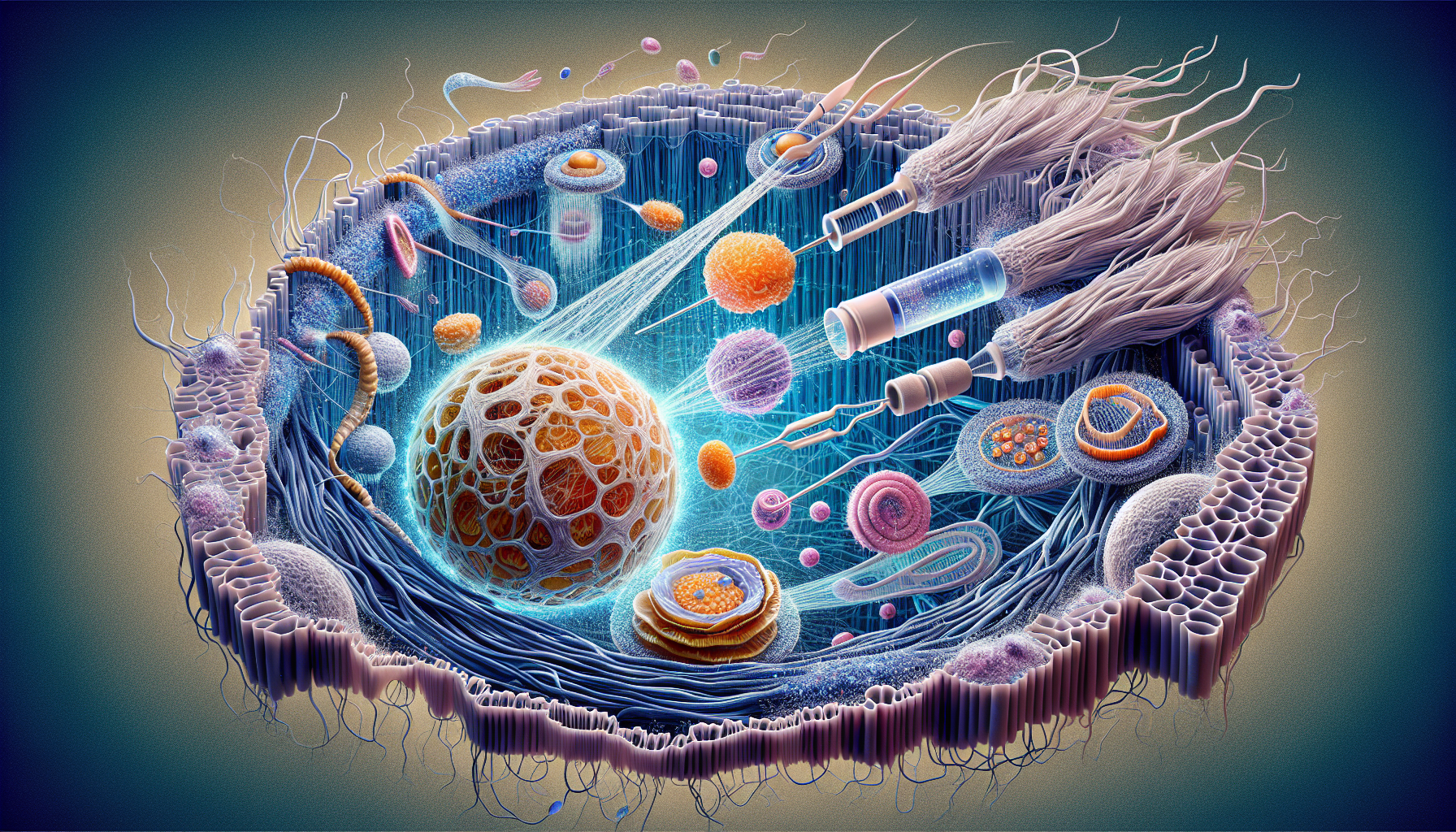Collagen for Menopause: Unlocking the Benefits for Skin, Joints, and More
Are you struggling with the changes that come with menopause, such as skin changes, hair loss, and joint pain?
A decrease in collagen production could be the culprit behind these symptoms, but collagen supplements may offer relief.
Discover how collagen for menopause can help alleviate some of the most common symptoms experienced during this transitional phase.
Read on for a straightforward look at the role of collagen in menopause and how supplements, diet, and lifestyle changes can support your well-being.
Key Takeaways
- Menopause reduces estrogen levels, leading to a decline in collagen production that affects skin, bones, and connective tissues.
- Collagen supplements may improve skin elasticity, bone density, and overall joint and skin health.
- Clean Sourced Collagens Powder is a premium, multi-collagen blend that may help alleviate common menopause symptoms and support overall well-being.
- A balanced diet rich in protein and Vitamin C, regular exercise, and tailored skincare support natural collagen production and menopausal wellness.
Understanding Menopause and Collagen’s Role

Menopause brings a lot of changes, including a drop in estrogen levels that hits collagen production hard.
This dip in collagen affects our connective tissues, bones, and skin, causing visible aging and discomfort. For women dealing with these symptoms, finding solutions that go beyond just surface-level fixes is crucial.
Collagen supplements may help with skin changes, hair loss, and joint pain during menopause. These supplements are getting a lot of buzz these days for their ability to strengthen the structures that menopause tends to weaken. They offer more than just a beauty boost; they also:
- Help shore up the body’s framework that’s been compromised by aging.
- Provide some defense against the onset of osteoporosis.
- Ease some of the distress caused by aging skin when taken regularly.
Estrogen and Collagen: A Vital Connection
Estrogen used to be the superstar behind our skin’s elasticity and strength. But when menopause hits, estrogen levels drop, and our skin starts to lose its firmness and flexibility.
This dip in estrogen leads to symptoms like skin changes, hair loss, and joint pain, but knowing this helps us tackle these issues head-on.
The cellular receptors for estrogen can still stimulate collagen production if triggered properly. This may be achieved through topical treatments containing estrogens, which aim to rejuvenate skin vitality by addressing signs of estrogen loss on skin health.
Visible Signs of Collagen Loss in Menopause

During the menopausal transition, as collagen production diminishes, our skin takes a hit. It grows more delicate and susceptible to bruising. Superficial lines evolve into distinct furrows.
Within five years of beginning this hormonal shift, women may witness drastic changes in their skin’s condition:
- a drop of up to 30% in collagen content,
- reduced elasticity within the dermis,
- diminished resilience,
- less moisture retention,
- and various menopause symptoms such as skin changes, hair loss, and joint pain.
These changes play a critical role in both how our skin looks and its overall well-being.
The physical changes that become evident in our complexion act as tangible indicators of the intricate relationship between collagen and estrogen levels—their collective decline signals an important phase shift for women, highlighting their influence over blood vessels’ integrity and functionality.
Collagen Supplementation: A Remedy for Menopausal Symptoms?
Many women, seeking to restore their youthful vitality, often resort to collagen supplements as a possible remedy for various menopause symptoms.
These dietary aids, frequently presented as hydrolyzed collagen, are reputed not just for improving skin elasticity but also for strengthening bone density – offering potential relief from issues like joint pain and sagging skin.
Yet caution should be exercised when adopting any new regimen. The realm of dietary supplements is wide-ranging and diverse.
Thus, it’s crucial for menopausal women to thoroughly assess the potential health risks associated with these products—particularly how they may interact with other medications or pre-existing medical conditions.
Types of Collagen Supplements
A plethora of collagen supplements populate the market, promising various advantages for both skin and joint well-being.
Offerings range from hydrolyzed collagen to deep-sea derived marine collagen, as well as substitutes catering to vegans.
Marine and bovine-derived collagens are typically preferred due to their comparably efficient absorption rates and similar perceived benefits. The decision between them might hinge on details like protein concentration per serving.
To enhance the effectiveness of these supplements, versions that are infused with vitamins and minerals—especially those including vitamin C known for its role in promoting collagen synthesis—may provide a more powerful effect.
Clean Sourced Collagens Powder: Your Menopause Ally
If you’re looking for a high-quality collagen supplement to support your menopausal journey, Clean Sourced Collagens Powder is worth considering.
This premium blend of 5 collagen types (I, II, III, V, and X) is derived from 4 real food sources – beef, chicken, fish, and eggshell – and fortified with vitamin C, B6, zinc, and silica for enhanced absorption.
What sets Clean Sourced Collagens Powder apart is its potential to alleviate common menopause symptoms by:
- helping reduce the appearance of fine lines and wrinkles,
- lubricating joints for improved mobility and comfort,
- promoting thicker hair and stronger nails,
- and even supporting cardiovascular health and weight management,
this supplement acts as a true ally during this transformative phase.
One of the best things about Clean Sourced Collagens Powder? It’s incredibly easy to incorporate into your daily routine.
The fine, odorless, and tasteless powder dissolves effortlessly without clumping, making it a breeze to add to your favorite drinks or recipes.
Plus, with 8g of complete protein (including tryptophan) and only 32 calories per serving, it’s a nutrient-dense choice that won’t derail your dietary goals.
As a health-conscious woman, you’ll also appreciate the third-party testing that ensures the absence of glyphosate, heavy metals, and pesticides in every batch.
So, if you’re ready to experience the potential benefits of collagen for menopause relief, consider giving Clean Sourced Collagens Powder a try.
Your skin, joints, hair, and overall well-being may thank you.
How Collagen Peptides Support Skin Health
Our skin, the largest organ of our body, benefits greatly from collagen—the most abundant protein in our human structure.
Supplements containing collagen peptides have been recognized for their ability to improve the hydration of this defensive layer, offering protection against aging’s impacts.
These peptides’ advantages penetrate deeper than just skin level. Research indicates they can lessen wrinkle depth and enhance the robustness of nails and hair.
Taking supplements with collagen could be a comprehensive partner in maintaining a young look as well as strengthening other tissues rich in keratin.
The Impact of Diet on Natural Collagen Production
A diet that is balanced and abundant in protein, as well as packed with a diverse selection of fruits and vegetables rich in vitamins and minerals, establishes the basis for your body’s natural collagen production.
Such nutrition plays an integral role in supporting your body’s capacity to produce this vital protein on its own.
Incorporating ample vitamin C and antioxidants into one’s diet enhances the body’s defenses against damage to bone cells, which can mitigate the necessity for external sources of collagen.
Individuals who successfully incorporate these nutritional elements into their daily dietary routine may sustain a vigorous level of personal collagen production, making reliance on additional supplements less imperative.
Protein-Rich Foods That Boost Collagen
The body’s ability to conduct the collagen symphony hinges on a range of amino acids, which are plentiful in foods high in protein.
Bone broth, known for its healing, anti-inflammatory benefits, and omega-rich fish serve as foundational sources supplying the essential components required for collagen production.
The dietary choices available span from animal-derived items like chicken and egg whites to plant-centered selections including whole grains.
This variety ensures that anyone can find nutritional ways to support their internal collagen production, regardless of dietary preferences.
The Role of Vitamin C in Collagen Synthesis
The crucial nutrient, Vitamin C, is central to the body’s generation of pro-collagen—a vital substance that strengthens skin, bones, and connective tissues.
Present in vibrant citrus fruits, succulent berries, and crisp peppers among others, this vitamin acts as a foundational element for collagen synthesis.
It enables the body to restore its reserves of connective tissue naturally instead of solely relying on external supplements.
Ingesting foods abundant in Vitamin C allows the body to produce its own collagen fibers effectively. By doing so, it reinforces our fundamental structure from within.
Beyond Supplements: Lifestyle Approaches to Enhance Collagen Levels
Though supplements can be helpful, they are just one component of a larger collagen framework.
The daily decisions and habits we engage in create an intricate pattern that either bolsters or detracts from our collagen levels.
Lifestyle methods encompassing various elements such as:
- regular physical activity,
- dedicated skincare routines,
- adherence to a nutritious diet,
- prudent avoidance of too much sun exposure,
- and managing stress effectively.
These are all crucial in maintaining existing collagen and promoting the synthesis of new fibers.
Regular Exercise to Prevent Bone Abrasion
Physical activity serves as a crucial partner in combating the loss of bone density, not just an instrument for maintaining fitness.
Engaging regularly in weight-bearing and resistance exercises promotes bone growth, providing formidable defense against age-related decline that threatens our bones’ integrity.
Beyond preventing weight gain, such workouts are pivotal for preserving general health.
Pairing consistent exercise with collagen supplements yields dual benefits: it aids in warding off decreases in bone density while simultaneously bolstering skin collagen levels, potentially decelerating the signs of aging on our faces.
Skincare Routines to Protect Existing Collagen
Our complexion needs constant care to maintain its collagen. For daily protection:
- Sunscreen with an SPF of at least 30 acts as a barrier against UV rays that may unravel the fragile strands of skin’s collagen.
- Vitamin C serums work to amplify collagen production.
- Moisturizers help retain hydration and shield against dryness which could otherwise impair collagen.
These measures bolster our skin’s defenses and contribute to its continued healthfulness and suppleness.
Integrating skincare items tailored for postmenopausal skin needs—addressing shifting pH levels and minimizing irritation—can aid in preserving the resilience of existing collagen.
Personalized Collagen Strategies for Menopausal Women
Every woman experiences unique menopause symptoms. Addressing these requires customized collagen strategies tailored to individual health, lifestyle, and symptoms.
By personalizing the type and amount of collagen supplements, women can ensure effective support during this transition.
When to Start Collagen Supplementation
During the transitional phase of approaching menopause, women often contemplate proactive health measures.
One key consideration is determining the optimal timing for starting a collagen supplementation regimen.
When taken consistently over a prolonged period, usually around six months, these supplements can display their full effects.
The range of possible benefits includes alleviating joint pain and enhancing skin elasticity.
Tailoring Collagen Intake to Your Needs
Starting a regimen of collagen supplements ought to be done with guidance.
Engaging with healthcare professionals can shed light on the journey, assisting in identifying the appropriate dosage and form of supplementation that aligns best with individual needs.
Reliable brands such as Organixx come highly recommended by health coaches for those in search of premium-quality hydrolyzed collagen supplements. These naturally derived supplements are designed for optimal absorption by the body.
Summary
As we’ve explored, collagen plays a multifaceted role in menopause and overall wellness.
From the impact of diet and exercise to the thoughtful use of supplements like Clean Sourced Organic Collagens Powder, you have the power to navigate this transitional phase with resilience and grace.
Remember, a balanced diet rich in protein and Vitamin C, coupled with regular exercise and a targeted skincare routine, can support your body’s natural collagen production.
And if you decide to incorporate a premium supplement like Clean Sourced Organic Collagens Powder, you may experience additional benefits such as reduced joint discomfort, improved skin elasticity, and healthier hair and nails.
Ultimately, the path to menopausal wellness is unique to each woman.
By staying informed, listening to your body, and making choices that align with your personal needs and goals, you can embrace this transformative journey with confidence.
If you’re ready to explore the potential of collagen for menopause relief, consider giving Clean Sourced Organic Collagens Powder a try – your future self may thank you.
Frequently Asked Questions
Should a 50 year old woman take collagen?
Yes, taking a collagen supplement consistently for at least six months can benefit a 50-year-old woman. It may help reduce joint pain and improve the appearance of skin, hair, and nails.
At what age should I start considering collagen supplements?
As you approach your 40s and 50s, it’s wise to consider collagen supplements. This is because natural collagen production drops around menopause, affecting skin health.
Are there any natural food sources of collagen?
Certainly, incorporating natural food sources such as bone broth, fish, egg whites, legumes, and whole grains into your diet is beneficial since they are rich in the amino acids that contribute to collagen production.
By consuming these foods regularly, you can enhance your body’s ability to synthesize collagen.
Can exercise really help maintain collagen levels?
Indeed, exercise helps maintain collagen levels by supporting bone health through weight-bearing and resistance exercises.
How long does it take to see the effects of collagen supplementation?
It’s recommended to use collagen supplements consistently for at least 6 months to see noticeable effects on skin health, joint pain, and overall well-being.
Organixx Clean Sourced Collagens blend contains five types of collagen from four sources. What’s more, it’s combined with targeted nutrients such as zinc, vitamin C, and vitamin B6 which specifically enhance the bioavailability and potency of collagen. Clean Sourced Collagens is formulated from the ground up to enhance and support your body’s natural ability to heal and rebuild itself from the INSIDE out.





Comments